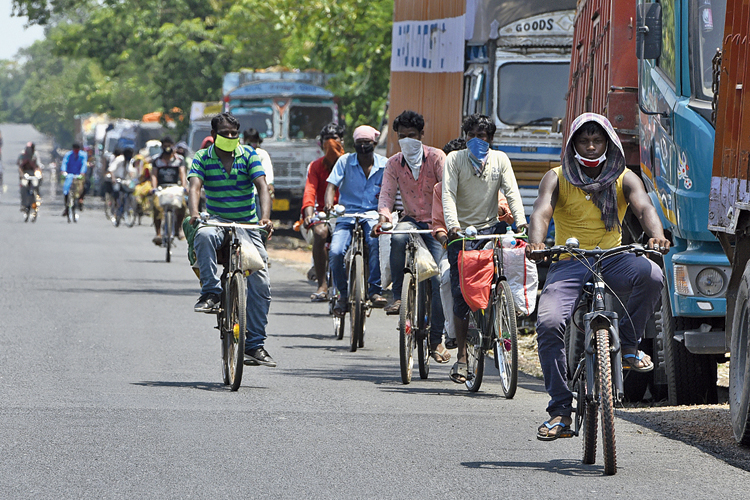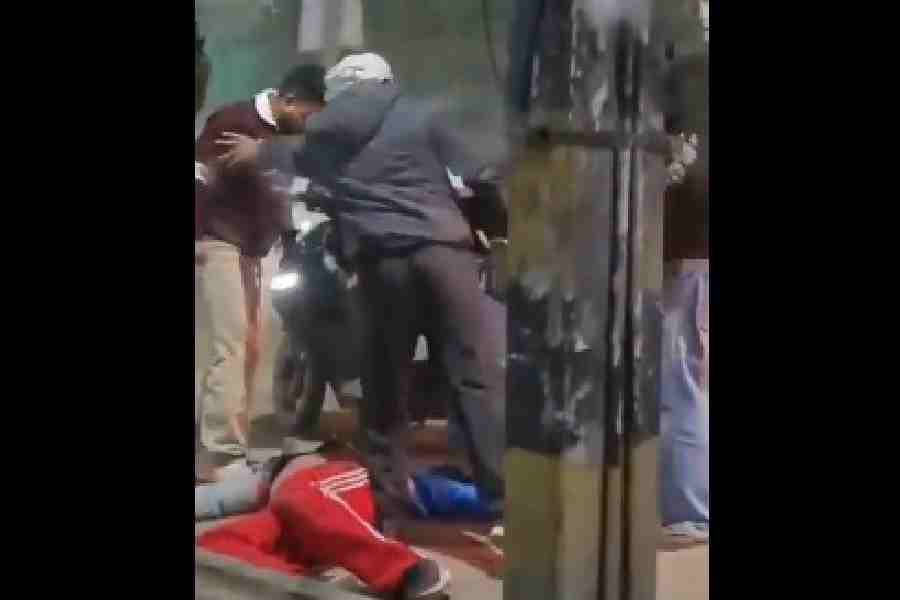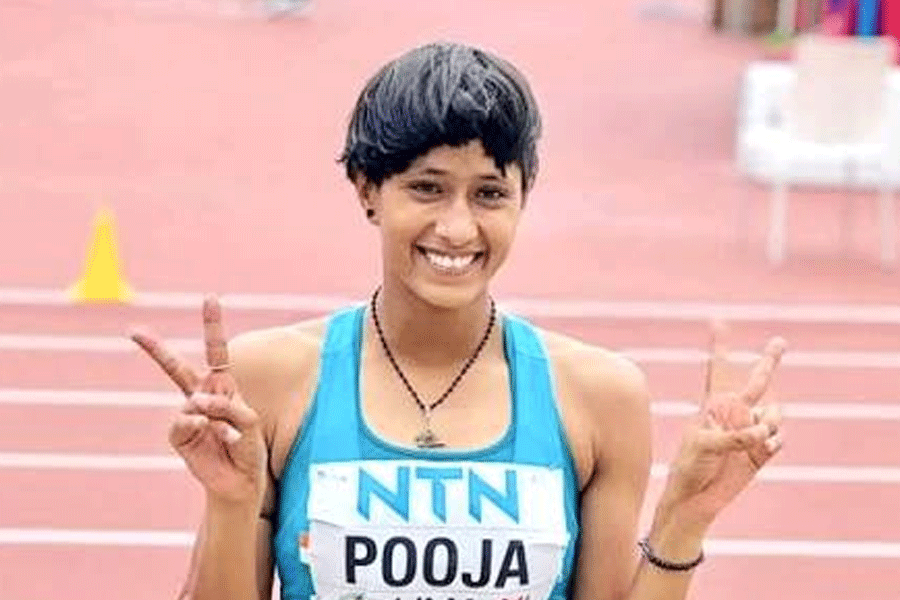Dankuni, a town in Hooghly district otherwise known for its industrial facilities, has turned into an international border of sorts in the midst of the coronavirus-induced lockdown.
Hundreds of migrant labourers from out of state who have been stranded in Bengal starting late March and have set out to make audacious journeys on foot or bicycle are stranded at the very start of their journeys at the Dankuni NAKA post barely 21km from Calcutta.
According to police estimates, at least 250 such persons were stopped at the check point this weekend for not being in possession of the proper documents required to get through.
Though a situation such as the Covid-19-induced lockdown merits the strictest safety measures, it beggars belief to assume that those who did not have the means for road or rail transport would have the wherewithal to secure online passes with all necessary documentation.
On Sunday morning, The Telegraph met two such groups — a total of around 45 persons — whose long journeys home were put to a grinding halt at the Dankuni NAKA check point.
Third time unlucky
A few kilometres before the checkpoint, this correspondent came across a group of young men cycling cautiously behind each other in a straight line. The group had packets of puffed rice, water and a heap of clothes bundled to the rear seats of each of their bicycles. The youths, they confirmed from a distance, were migrant labourers from Bihar’s Araria district hoping to get home from their places of work in Hooghly.
“We have already made two prior bids to get home. Let us see what happens today,” said Vakil Rishidev, who, along with 24 others, is employed at a cold storage in Sheakhala, Hooghly. On the first attempt, the group had got as far as Burdwan, where they were intercepted and allegedly manhandled by the police before being sent back. On the second attempt, on Sunday, they couldn’t get past Dankuni NAKA.
Vakil and his friends work as contract labourers. After working in Indore for several months, the group had been shifted to Sheakhala in early March shortly before the Covid-19 outbreak erupted. “Before closing the storage, the owner cleared 15 days’ payment. We have been living on that since, but now we are out of cash. We have no choice but to try and get home,” Vakil said.
Vakil added that after they had returned to their workplaces following the first failed attempt, their employer handed over Rs 4,000 and some dry ration to each of them. “We used the money to purchase bicycles so that we could make a more concrete attempt to get home,” he said.
“Each of us has spent at least Rs 1,500 to Rs. 2,000 on these second-hand cycles which we bought from a local vendor. One of us had to purchase a new cycle for Rs. 4,000 because old cycles were all sold out. The rest of us made small contributions to help him out,” said Jitendra Singh, another member of the group.
Several of these men are the only bread earners in the family and say they are now left with nothing more than a few hundred rupees.
On Sunday, this correspondent followed the group of youths at a distance to see first hand whether their second shot at getting home would turn out successfully.
A short distance away from the makeshift camp where they had been housed, the youths were stopped on the side of the highway by a patrol and asked for travel documents. Failing to produce them, they were cursorily asked to move over to the opposite side of the road, joining a group of 10 others who had attempted a similar thing hours ago.
“We had to stop two such groups since this morning,” said an officer posted at the checkpoint.
No home to go to
On the other side of the road, beneath a makeshift canopy for shade, a different group of visibly fatigued youths were overheard discussing their worries of how they would make the long journey home and sustain family life for the coming few years. Sitting close to their parked cycles, some of them had their shirts unbuttoned or towels tied to their head to stop the relentless perspiration.
Nearby, two young siblings were sitting in a corner nestled into their mother’s lap. The weary mother was resting on a bundle of clothes, trying to catch some sleep in the face of bright sunlight pouring through the makeshift canopy. Seeing the woman nodding off, the men from the other group came forward and sat facing the children at a safe distance.
Sikander Yadav, Digambar Das and 18 others have been cycling from Metiabruz, a neighbourhood in Calcutta, to their homes in Giridih district in Jharkhand. The two men have also had their wives and children with them. In Calcutta, the men worked as masons at different construction sites.
“We started at 3am on Sunday morning and reached Dankuni around 8am. We were stopped and since then, we are stuck here,” Sikander said. It was almost 1pm at the time. “We have exhausted almost all the money we had. Our landlords have forced us to leave because we couldn’t pay the house rent for the past two months,” he added.
It would have taken nearly three days to reach Giridih on a cycle, but they were ready to face the pain required to make it home.
“If we are sent back to Calcutta, where will we go? Our landlord is abusive, and now that we have left, will he allow us inside again?” asked Digambar.
No exit
Police personnel at Dankuni NAKA said they were preparing a list of all persons they had intercepted. These names are being communicated to the corresponding police stations of the areas where those labourers lived in the state.
This correspondent contacted Vakil Rishidev over the phone on Sunday evening. He said they had been sent back to the cold storage they were living in, for the third time. “We were brought here by the police in trucks. The police have seized our cycles. We don’t know when we will get them back,” Vakil said.










